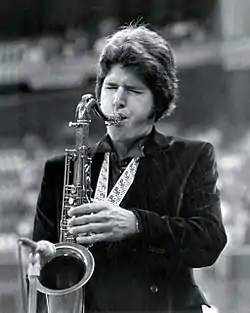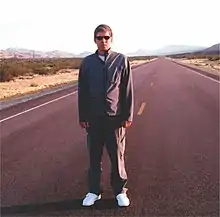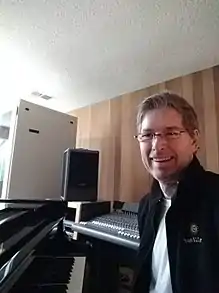Tim Gemmill
Timothy Jon Gemmill (born May 28, 1949) is an American jazz musician, composer, arranger, producer, bandleader, graphic designer and entrepreneur, who has been involved in musical projects since the late 1960s. Most notably; Music Projection Trio (1970–1972), Rorschach (1973–1977), Cozzetti & Gemmill Quartet (1978–1982), Cozzetti & Gemmill[1] (1983–present), Rocka Records (1994–2004), Rocka.com (1999–2004) and Cozgem Records (1981–present).[2]
Tim Gemmill | |
|---|---|
 Tim Gemmill performing the National Anthem, Seattle Mariners, Kingdome, August 1982 | |
| Background information | |
| Birth name | Timothy Jon Gemmill |
| Born | May 28, 1949 Seattle, Washington, US |
| Origin | Seattle, Washington and Hackensack (1972–1977), US |
| Genres | jazz, post-bop, avant-garde jazz, jazz fusion, digital jazz, techno |
| Occupation(s) | Musician, composer, arranger, record producer, bandleader, graphic designer, entrepreneur |
| Instruments | Tenor saxophone, soprano saxophone, flute, piano, electric piano, keyboards, synthesizers, digital audio workstation |
| Years active | 1967–present |
| Labels | Cozgem Records, ITI Records, Rocka Records |
| Associated acts | Cozzetti & Gemmill, Ron Holden & Good News |
| Website | cozzettiandgemmill |
Biography
Early years
Tim Gemmill had significant musical training and education in his early teens. His mother was very artistic (painting, sculpting, etc.) and encouraged creativity. In 1965, at age 16, he attended the Long Beach State College Stage Band Camp, studying jazz under bassist Ralph Pena[3] and acoustic pianist Toshiko Mariano; wife of alto saxophonist Charlie Mariano. During this time, he was getting saxophone lessons from the late Roy Kennelly.[4] Tim also received private instruction from Jabo Ward[5] and, later, Jordan Ruwe.[6] He was especially impressed with Mr. Ruwe, being a professional jazz musician (flutist/saxophonist), performing in and around the Seattle area. Tim remembers Jordan putting headphones on him of George Coleman, from a Miles Davis recording, with the volume turned up. This was to impress upon him the importance of breathing properly and having a good tone. In addition to saxophone teachers, he was also studying music theory with bassist David Friesen.
1967 was a busy year for Tim Gemmill. He was playing tenor saxophone/flute in the James Gardiner Jazz Orchestra[7] with alto saxophonist Joe Brazil, the Shoreline High Stage band with trumpeter Jay Thomas[8] and the Jimmy Hanna Big Band.[9] It was at this time, that Tim and Bob became close friends; practicing their horns together and sitting in at the Queequeg,[10] an after-hours club run by pianist/bassist Jerry Heldman.[11] Larry Coryell, Chick Corea, McCoy Tyner and the Adderley brothers (Cannonball & Nat), in town performing at the Penthouse,[12] sat in at the Queequeg. In 1968, Tim was accepted to Central Washington State College, but chose, instead, to pursue a musical career.
Road Songs
.jpg.webp)
In 2013, the release of Road Songs represents a departure from the norm, with almost exclusive use of digital devices and/or synthesizers (new and old). The album is a C&G production (all original compositions, except for one Bach piece); musical arrangements and instrumentation by Tim Gemmill. Road Songs is unique with an acoustic element combined with MIDI, a 24 track Mackie board and Digital Audio Tape; the sound so clean that noise reduction was not required in final editing. Jay kenney (Audio Logic)[13] is the mixing engineer, Dave Davis (The All Night Party),[14] the mastering engineer, and QCA, Inc.[15] responsible for CD manufacturing.
New York music critic, Melissa Nastasi, writes, "Meet Tim Gemmill, a unique artist paving his way in the electronic era. Recently releasing the record, Road Songs, Gemmill provides his own version of electro laced music that will intrigue the listener from the very beginning. The ten track record is a stunning collection of songs like you have never heard before. Gemmill's use of synthesizers and Memory Moogs fill Road Songs with a harmonious and delightful surprise." Ms. Nastasi continues, "Tim Gemmill has created a distinctive collection of tracks within Road Songs. His unique blend of synthesized instruments, take the digital era of music into a new direction. Gemmill's music exploration on this record is honest, energetic and truly one-of-a-kind."[16]
Alice Neiley, also of New York, writes the following, "electronic music often gathers up so many bells and whistles in any given composition that the listener can barely find the center, the core mood, the melody, let alone their own center of gravity, or, more frankly, that clear, almost physical reason to keep listening that good music provides every time. Of course, this is coming from a listener who doesn't usually spend much time with electronic music, so perhaps others would say the opposite. Tim Gemmill, an emerging artist, recently released Road Songs, an unusually solid, soulful album, especially for the electro genre. The tracks move between lengthy, synthesized epics, playful, funk ridden pieces, and pieces rooted in classical themes and West African instrumentation. To say the least, it's eclectic. To say the most, it's a life and all its rhythms, it's a heartbeat." Ms. Neiley concludes, by saying, "Contrary to my initial opinions of electronic music, Tim Gemmill gives the heart a jolt or two, tugging a few strings of longing and sorrow as well. He's obviously trying to open up the genre with a new wind, and in that endeavor especially, Road Songs is a success—each transition between songs perfectly timed, each shift in heartbeat earned."[17]
Road Songs 2

The release of Road Songs 2, in 2017, is also a C&G production; original material provided by Tim Gemmill. Once again, Jay Kenney does the album mixing, with Dave Davis handling final mastering. Alex Henderson, who did the liner notes for Road Songs 2, February 2017, writes, "Tim Gemmill has absorbed a wide variety of music over the years. The Seattle-based jazz improvisor and multi-instrumentalist was influenced by the acoustic post-bop innovations of John Coltrane and Miles Davis early in his career, but he was subsequently inspired by the electric jazz-rock fusion that Davis, Wayne Shorter & Joe Zawinul's Weather Report, Chick Corea's Return to Forever, Herbie Hancock's Headhunters and John McLaughlin's Mahavishnu Orchestra championed during the 1970s. Gemmill, however, also appreciates many different types of rock and R&B; one of his late heroes is the late Godfather of Soul James Brown. And many of his inspirations come to the surface on Road Songs 2, a sequel to his 2013 release, Road Songs."
Mr. Henderson continues, "Road Songs 2, like the first Road Songs, is a solo project from the long-time partner of fellow Seattle resident and jazz improvisor Bob Cozzetti, who he met in 1965. 2017, in fact marks Cozzetti & Gemmill's 50th anniversary as collaborators--and after all these years, Gemmill still welcomes Cozzetti's insights. Cozzetti & Gemmill produced Road Songs 2 together (with Jay Kenney serving as mixing engineer; Dave Davis as mastering engineer) and decided to release it on Cozgem Records, the independent label they founded in 1981. But, Gemmill, ultimately, is the one in the driver's seat on Road Songs 2. In addition to playing all of the instruments himself and providing the sounds of everything from drums and bass to keyboards, Gemmill composed most of the material."[18]

Scott Yanow, June 28, 2017, writes, "Saxophonist- keyboardist Tim Gemmill is best known for his many projects with trumpeter-keyboardist Bob Cozzetti and for being an important part of the Seattle jazz scene for quite a few years. While Cozzetti is co-producer of Road Songs 2, as with the original Road Songs, Gemmill plays all of the instruments and wrote all but one of the songs." Mr, Yanow continues, "Through overdubbing and expert use of such keyboards as the UltraProteus, the Memorymoog, the Prophecy, the Kawaii, a drum synthesizer and inventive samplers, Tim Gemmill creates a digital orchestra. In his playing, one can hear not only keyboards but guitar, powerful bass lines, drums, percussion and, on 'Can You Read My Mind,' wordless voices. The colorful music has a spontaneous feel yet was obviously well planned."
Scott further states, "Road Songs 2 concludes with the one song not composed by Gemmill. 'Can You Read My Read My Mind,' which was written by John Williams, from the 1970s hit movie Superman. Originally a vocal ballad, it is transformed into a funky piece filled with five-note patterns and, although instrumental, it utilizes the sound of wordless singers."[19]
Discography
References
- Musical Legacy - Cozzetti & Gemmill. Author; Scott Yanow - retrieved September 2017
- Cozzetti & Gemmill Biography. Author; Alex Henderson – retrieved September 2017
- Ralph Pena Biography. Review by Scott Yanow, AllMusic - retrieved December 2017
- Father's dream is music to son's ears. Author; Diane Wright, March 22, 2006, The Seattle Times - retrieved December 2017
- Saxophonist 'Jabo' Ward dies at 85. Author; Marius Nordal, April 15, 2004, The Seattle Times - retrieved March 2018
- Jordan Ruwe: Minor Blues Tunes in All twelve Keys. Author; Robert Rawlins, 2006, Amazon.com - retrieved December 2017
- Gardiner Music Mentoring - retrieved December 2017
- Jay Thomas - Jazz Trumpet, saxophone - retrieved December 2017
- Jimmy Hanna Big Band. The Jimmy Hanna Band, AllMusic - retrieved December 2017
- Origin Records Artist - Jerry Heldman. Paul de Barros, Seattle Times – Arts & Entertainment: August 18, 2000 - retrieved December 2017
- Jerry Heldman: Good Samaritan, “Jazz Wizard,” My Dad. Article by Caroline Heldman, October 16, 2013 - retrieved December 2017
- The Penthouse (Seattle). Article by Wikipedia - retrieved December 2017
- Audio Logic - Seattle Recording Studio - retrieved January 2018
- The All Night Party - retrieved January 2018
- QCA Compact Disc CD / DVD Replication, Duplication and Manufacturing - retrieved January 2018
- Tim Gemmill, Road Songs. Review by Melissa Nastasi, Review You®, August 4, 2014 - retrieved January 2018
- Tim Gemmill, Road Songs. Review by Alice Neiley, Review You®, August 11, 2014 - retrieved January 2018
- Tim Gemmill Interview. Liner notes by Alex Henderson, Fedruary, 2017 – retrieved January 2018
- Tim Gemmill, Road Songs 2. Review by Scott Yanow, June 28, 2017 – retrieved January 2018
- Concerto For Padré. Review by Lee Underwood, West Coast Editor Down Beat, September 1981 – retrieved October 2015
- Soft Flower in Spring. Review by A. James Liska, Down Beat, December 1983 – retrieved October 2015
- Cadence – April 1995. Review by David Dupont, Cozzetti & Gemmill, Timeless, ROCKA COZGEM 101, Vol.21 No.4, page 89
- Timeless. Review by Alex Henderson, Review You®, October 14, 2014 – retrieved October 2015
- Voyage of the Mummy. Review by Alex Henderson, Review You®, October 14, 2014 – retrieved October 2015